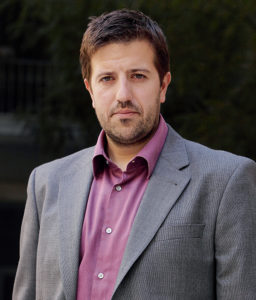Is COVID-19 good for the natural environment? If we separate, as all humans do for some strange reason, human nature from the natural environment, the answer seems to be yes. COVID-19, unfortunately, kills humans, but its effect on the environment, at least in the short term, appears to be beneficial, as evidenced in recent measurements and studies on atmospheric pollution.

The European Space Agency’s (ESA) Copernicus Atmosphere Monitoring Service (CAMS) recently released images of the atmosphere over Italy, comparing January (2020) with March (2020) – before and after the lockdown went into effect. Scientific analyses show that the levels of nitrogen dioxide in the atmosphere — especially in Northern Italy, which represents a large part of the Italian economy and production — have dropped significantly1, due to decreased traffic and industrial activity.
From an environmentalist point of view, there is a silver lining among the dark clouds of the COVID-19 pandemic: It is an exogenous shock (a term regularly used by econometricians) which allows us to empirically examine the hypothesis that a clean causal relationship exists between human activity and climate change — a hypothesis denied by many, people who anyway do not follow the scientific data.
Unfortunately, catastrophes condensed in time and space, such as the COVID-19 pandemic, attract our attention a lot more than catastrophes extending over time and space
Although more scientific work is needed — such as, for example, analyzing data from China (note that there is already a methodologically rigorous study showing a reduction of 20-30%2 in the extremely hazardous for human health PM2.5 element as well as in nitrogen levels in China3) — it appears that a causal relationship between human activity and climate change does exist and this is or will be, proven methodologically in a way that leaves no room for doubt even to the most distrustful.
Photographs and studies shared by ESA, as well as the symbolically significant reports that fish and wildlife species are returning to the Venetian Lagoon, are powerful examples for the disbelieving human intelligence, especially at a time when we are coming to grips with our littleness and fragility anew (albeit, unfortunately, these thoughts are not meant to last long). As a result, such good news, one of COVID-19’s unlikely offerings, call for.
Decisions on the vast amounts of money that will rightfully be made available to support the economy in the months ahead will have to be tied, where possible, to climate change and sustainable development goals
And then there’s the bad news. Climate change no longer enjoys the dynamic and popularity in the global community that it did until just a few weeks ago, and this trend is going to increase in the months to come. In confirmation of findings from studies I am conducting in cooperation with exceptional colleagues during the last few years in the field of organizational psychology and CSR, people tend to prioritize individual responsibility over social and environmental responsibility. Unfortunately, we are unable to realize that a lack of social and environmental responsibility will come back to haunt us. Indeed, there are indications4 that European Commission plans regarding the European Green Deal are likely to be quarantined for they are no longer a priority. Handling of the impending recession5 is now a priority: “People are dying and losing their jobs, who cares about climate change?” some will say. But this reasoning is short-sighted: Climate change will lead to more deaths, unemployment and social tension (i.e. climate refugees), and this impact will last across both space and time — if it hasn’t started already. Unfortunately, catastrophes condensed in time and space, such as the COVID-19 pandemic, attract our attention a lot more than catastrophes extending over time and space (e.g. the 120,000 deaths per year in the United States associated with and attributable to stressful practices in the workplace6, aka workplace stressors, which also qualify as an epidemic).
Besides good luck, it is these qualities of creativity and cooperation that have helped homo sapiens, the wise man, to prevail
The takeaway is that decisions on the vast amounts of money that will rightfully be made available to support the economy in the months ahead will have to be tied, where possible, to climate change and sustainable development goals. But let us have no illusions. Such compromises, unfortunately, are hard to achieve. Some will use the pandemic and ensuing economic recession as a pretext to not proceed to the implementation of sustainable development investments. Investment plans regarding climate change and the science supporting sustainable development (just ask yourselves how much comfort and hope we seek and find in science during this crisis) will take a lot of effort to keep high on the agenda, aided by creativity and cooperation to keep both irons in the fire. Humanity, if it so wishes, has a surplus of such virtues. Besides good luck, it is these qualities that have helped homo sapiens, the wise man, to prevail. His wisdom, however, remains to be seen.
Post scriptum
The economic recession that will follow the COVID-19 pandemic will reveal which among the companies that recently announced their official transition7 from the shareholder capitalism dogma — which they have sworn by since 1997 — to the stakeholder capitalism model (i.e. the Business Roundtable lobbying group) were serious about transitioning and which did so simply for publicity purposes.
1. https://www.esa.int/ESA_Multimedia/Videos/2020/03/Coronavirus_nitrogen_dioxide_emissions_drop_over_Italy
2. https://atmosphere.copernicus.eu/amid-coronavirus-outbreak-copernicus-monitors-reduction-particulate-matter-pm25-over-china
3. https://www.esa.int/Applications/Observing_the_Earth/Copernicus/Sentinel-5P/COVID-19_nitrogen_dioxide_over_China
4. https://www.euractiv.com/section/energy-environment/news/green-deal-facing-delays-due-to-coronavirus-eu-admits/
5. https://www.greentechmedia.com/articles/read/eu-green-deal-should-now-be-canceled-says-czech-pm
6. https://doi.org/10.1287/m
7. https://opportunity.businessroundtable.org/ourcommitment/ nsc.2014.2115
This article was originally published in Greek on Kathimerini.gr





